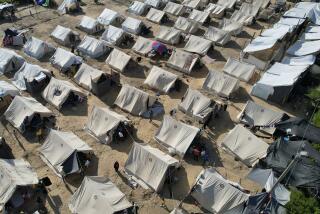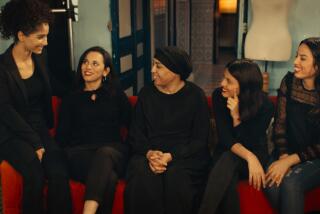Saharawis Create a New Arab Culture in Exile
- Share via
EL AYOUN REFUGEE CAMP, Algeria — The sun chars everything to cinder around here. It’s a barren, wind-lashed, inhospitable desert-- hardly the place to raise children or much of anything else.
But thousands of Saharawis, cast here by political upheaval, have lived for 25 years in refugee camps in these wastelands of southwestern Algeria. Against all odds, they have raised a nation in exile.
What’s more remarkable is the society that’s emerged: Largely nurtured by women, it stands out starkly from that of other Arab and Muslim peoples. Saharawi women have demanded and won equal rights. They receive full education, have work opportunities similar to men’s and can vote in elections, held every four years.
On a personal level, marriage partners are freely chosen, women can initiate divorce, and contraception and abortion are permitted.
“We are proud to be women, proud to be Arabs, proud to be Muslim, but we do not intend letting anyone dictate to us how we should live our lives,” Mariam Salek, culture minister in the Saharawi government in exile, said in an interview.
The Saharawis, descendants of nomadic tribes, live in tent cities that sprouted when they fled their neighboring Western Sahara homeland after Morocco annexed the 110,039-square-mile land at the end of Spanish colonial rule in 1976.
Morocco still insists it is the rightful ruler of the territory, which is rich in phosphates, and says Saharawis are simply Moroccans.
To assert their claim to an independent land, Saharawi men formed the Polisario militia--the Popular Front for the Liberation of the Saguia de Hamra and Rio de Oro, the regions of the former Spanish Sahara. They fought a 15-year insurgency, something of a Cold War conflict since their allies in the battle against U.S.-backed Morocco were often radical states such as Algeria, Libya and Cuba.
Today a decade-old, U.N.-mediated cease-fire is holding while debate drags on over the terms of an independence referendum. The Saharawis are resisting attempts to give voting rights to Moroccans who have moved into the territory.
Although the truce holds, Saharawi men are again on patrol, ready for a possible return to war. It reminds Salek of earlier days when women organized the first camps while men did the fighting.
“With men at the front, we had to invent a social organization,” she said.
In those days, the main task was not to succumb to the temptation to return to territory under Moroccan control or disperse and integrate into Algeria or neighboring Mauritania.
“When we first came here there was nothing, absolutely nothing,” said Mariam Hassan, who at 16 fled the Western Sahara city of Smara and escaped on foot from the Moroccans.
“At night we used to unwrap our shawl dresses and, with some sticks, we’d set up tents to shelter the children,” said Hassan, a leading Saharawi singer who lost three brothers in the war. Now 41, she has five children, all born in the camps.
The Saharawi camps are named after the four main cities of the Western Sahara--El Ayoun, Smara, Dhakla and Aoussert--and the refugees are distributed according to their origins.
Built on parched, sandy land, the settlements have mushroomed into virtual cities with a population of some 200,000. They lack running water and draw electricity from solar-powered batteries, but are models of organization, divided into districts with “town halls” run by the women.
Women are 56% of the electorate and have seven deputies in the 51-seat Parliament. Salek’s appointment last year as the first female minister in President Mohammed Abdelaziz’s Saharawi Arab Democratic Republic was seen as recognition of the women’s achievements.
Salek said Saharawis are “unique and very advanced” compared with the rest of the Arab world.
“In so many countries women almost don’t exist,” she said. “They’re not allowed to vote or do so many things, they have no basic rights. There is nothing the Saharawi men can do that women can’t.
“Much still needs to be done to further the equality, but the problem now is with ourselves, our own self-confidence as women, not with men, laws or the government,” the 36-year-old Salek added.
The Saharawis’ economy has not kept pace with their politics, however. They remain almost totally reliant on United Nations aid and contributions from friendly nations. Besides some mud-brick structures, the camps consist of thousands of single-room tents, the vast majority U.N.-supplied. Each family is entitled to a tent and a milk goat.
Money has little function in the camps since there is not much to buy or sell. Work in the schools, hospitals and communal farms is carried out on a cooperative basis.
Food is rationed, and the daily diet consists of semolina or legumes and tinned fish, along with bread, goat’s milk and the traditional green tea and mint of Arab society.
Warts on children’s faces and the stains on their teeth point to widespread nutritional problems, but no one goes hungry.
Perhaps the Saharawis’ most ambitious achievement has been in education. Under Spanish colonial rule, an estimated 90% of Saharawis were illiterate. Now, virtually everyone can read and write, most speak one or two foreign languages, and many are trained as doctors, nurses, mechanics or technicians.
“From the beginning, we were aware that we must have as many children as possible but we must also educate them. Otherwise our race would disappear,” said Maarouf Bud-da, a 29-year-old soldier who studied in Cuba for 11 years.
The average Saharawi family has five or six children. Boys and girls attend camp schools until age 12, when nearly all are sent to study in politically friendly countries. After completing high school or college, most return to the camps or join the Polisario army.
While the Saharawis have built a liberal society in exile, some fear the women’s achievements may be erased should they return home. But Salek insists that won’t happen.
“When we get independence and a normal country, we won’t let men cut back the role we play,” she said. “Besides, we don’t believe they will try.”
More to Read
Sign up for Essential California
The most important California stories and recommendations in your inbox every morning.
You may occasionally receive promotional content from the Los Angeles Times.












